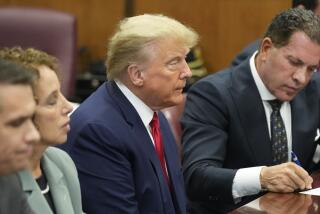Harvard Panel Calls for Frequent Presidential Press Conferences
- Share via
WASHINGTON — A commission of journalists and academics called Wednesday for reviving the presidential press conference and making it a “frequent, routine and undramatic” institution.
“The longer presidents go without a press conference, the greater the suspicion that there is something to hide, and the greater the pressure becomes for holding press conferences,” the panel said.
“When, ultimately, the President holds a conference, it is liable to be a hostile affair in which both the President and the press look bad. It would seem better, on balance, for the President to take his lumps on a more frequent basis,” it said.
‘Media Must Mend Ways’
At the same time, the Harvard Commission on the Presidential News Conference said, the media must mend their ways if the press conference is to revive. The public will not lend its attention to the sessions if it believes that reporters’ questions are unfair, irrelevant or overly aggressive, it concluded.
The 16-member commission, appointed by the Joan Shorenstein Barone Center on the Press, Politics and Public Policy of Harvard University’s John F. Kennedy School of Government, studied the issue for a year. It was co-chaired by former newscaster Marvin Kalb, director of the center, and Frederick W. Mayer, assistant professor of public policy at Duke University.
The commission said the presidential press conference, a 75-year-old institution, “is not aging well” and that under Ronald Reagan it has fallen into “a serious state of disrepair.”
Reagan has held 45 formal news conferences in his nearly eight years in office, and once went 5 1/2 months without a formal meeting with reporters. President Franklin D. Roosevelt met with reporters nearly 1,000 times in 13 years.
All Parties Would Benefit
“We believe that all parties would benefit from restoring the habit of frequent, routine and undramatic news conferences,” the panel’s report said.
Properly conducted, news conferences can serve presidents, press and public alike, the commission said, and all suffer when the institution deteriorates.
The panel recommended that presidents meet with the media twice a month during daytime hours--once with reporters who cover the White House routinely and once with smaller groups of journalists--and hold six televised evening news conferences a year.
Daytime news conferences should be held “to reduce the temperature and encourage more substantive and useful exchanges,” the panel suggested. It said this would give morning newspapers more time to prepare stories and allow television evening news programs to show highlights.
More to Read
Sign up for Essential California
The most important California stories and recommendations in your inbox every morning.
You may occasionally receive promotional content from the Los Angeles Times.













